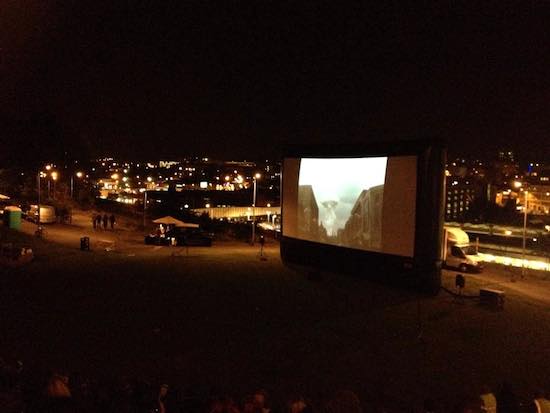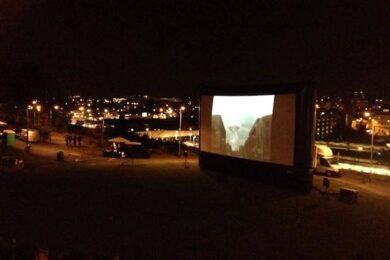Photo by Andy Green
Since launching in 2008, Sensoria has steadily built a reputation for innovation in live music and film. It’s the most unique and unusual fixture in Sheffield’s busy festival calendar by a mile, and continues to expand in scope and scale (who else would cram 400 people into a chilly amphitheatre to watch a BBC drama from the 1980s?). Named after a song by Cabaret Voltaire, each year Sensoria acts as a bridge connecting the city’s existing cultural architecture with new artists, new spaces and new ways of doing live events. It also taught us a thing or two about car mechanics.
Great film, plus great music, don’t necessarily equal perfect live soundtrack
Sensoria really made a name for itself with its live film scores, whether it’s A Hawk And A Hacksaw backing Hungarian folk epic You Have Already Gone To The Other World, or British Sea Power doing their best fishermen impression for Man Of Aran. At these events, you saw movies and musicians in perfect sync, so it’s a little disappointing to find Esben And The Witch don’t quite slot into place with their score for Argentinian film La Antena.
First, there’s a logistical challenge in watching a subtitled film set in a City Of Silence where most, but not all of the characters no longer have voices, when all of the original audio that would help you make that distinction has been stripped away to make room for EATW. But the real issue is the two don’t match. La Antena, from 2007, shares a papery aesthetic with Georges Méliès’ A Trip To The Moon (or <a href="https://www.youtube.com/watch?v=NOG3eus4ZSo" target=out"> that Smashing Pumpkins video) plus the angular camera work of Wes Anderson. Often set in bare, brutalist urban surroundings and retrofuturistic sci-fi laboratories, it’s shot with such delicate precision that EATW, while impressive, are simply too wild, too rugged, too feral. Though occasionally this works, such as when a wall of dissonance accompanies the frantic opening shots of anonymous hands flurrying across a typewriter (and generally, the approach to La Antena‘s strangely supernatural climax works better than the rest of the film) there are other films that EATW could score better, and other bands that would fit La Atena more comfortably.
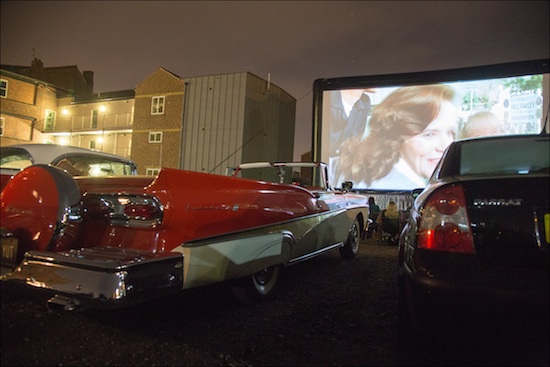
Photo by Pixelwitch Pictures
Radio is the future of live performance
Tired of going to gigs where everyone’s chatting on distractingly and, once again, you find yourself stood behind the tallest bloke in the room? Well then, Kafka Chic ‒ a charming 45-minute musical docu-drama that tells the admittedly familiar, slightly self-important story of the 1970s Sheffield sound ‒ could be for you. Because as well as being broadcast on local radio stations, the piece could be heard in several cafes around town for the kind of unique live experience that Sensoria does best. Who knew it could be so refreshing to go to a public event where you can relax with a decent cup of coffee, surrounded by total strangers sitting in reverential silence as you all listen intently to the show, free from distractions? You don’t even have to worry about craning your neck to see.
Every town planner in the North needs to watch Stop Making Sense
Like many areas of Northern England, Shalesmoor in Sheffield was once a hub of industrial activity, and now it’s not. What it does now have, however, are a few people dedicated to giving the area another go. Thus, we have Furnace Park, a wonderfully jagged little community space that’s hosted all sorts of arty activities including Sensoria’s outdoor screening of Talking Heads’ classic concert film Stop Making Sense.
Obviously Stop Making Sense is completely amazing ‒ that’s sort of beyond opinion and you don’t need us to tell you all about the sensational musicianship, the spectacular performances, the lamp dance, the big suit. But in Furnace Park it takes on a new meaning. After all, this is a show that starts from nothing: David Byrne stomping his foot along to a tape deck, strumming the chords to ‘Psycho Killer’, until the rest of the band slowly start to appear and the stage set is built around them. Ultimately, it leaves you brimming with possibility. Because if Talking Heads can construct the greatest concert film of all time around a man, a guitar and a tape deck, then Sheffield can become the cultural capital of the north in no time, with Furnace Park as our ‘Psycho Killer’.
Music is completely amazing
That might sound like a somewhat obvious claim for a website like this one to make. But we don’t just mean "music is good, we like music". We mean that the things that music is seen to do in Michael Rossato-Bennett’s documentary Alive Inside, which got it’s UK premiere at Sensoria, will completely amaze you.
The film follows American social worker Dan Cohen, who is campaigning for music to be formally adopted as a treatment for Alzheimer’s and other conditions associated with memory loss. The scientific basis for Cohen’s methods is a little unclear, but what you see time and time again are lives practically written off, individuals crippled by fear, frustration and isolation, who become reanimated and renewed by the sheer happiness that a few organised sounds can evoke. You see schizophrenia sufferer Denise throw aside her walking frame and start to salsa when headphones are placed on her head; you see John, alone and unresponsive, suddenly begin to Charleston in his wheelchair to the sound of a brass band; you see Marylou shuffling around her apartment building, unsure of which button to press to operate the lift, immediately begin boogieing when she hears the Beach Boys. The star of the show is Henry, who’s embarrassed when he doesn’t recognise his own daughter, but can recite childhood anecdotes with a boyish glee once his favourite song is ringing in his ears.
Crucially though, this film is more than a sentimental tearjerker (though there are plenty of sniffles echoing round the cinema when the credits roll). It shows how easily any one of us could end up like Steve, who suffers from multiple sclerosis and hasn’t heard music for eight fucking years because he couldn’t bring his record collection to hospital with him.
Imagine not hearing music for eight years. Now imagine not being able to remember the name of your favourite band, the names of your children, the last time you had a visitor ‒ and think how incredible it is that you can switch off all that despair with a song. Music is amazing because it never leaves us: it will always be there to make you feel like your old self again.
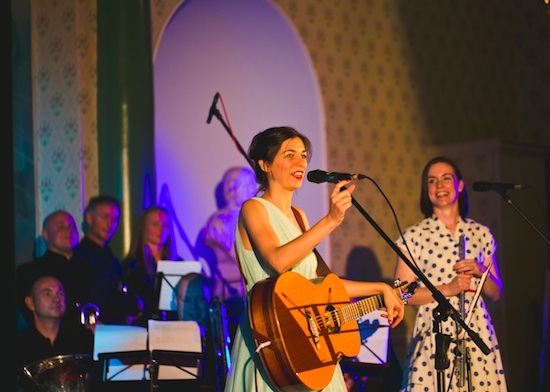
Photo by Nathan Gibson
How to pay tribute to music’s most tragic figures, and how not to
Two of the other films shown at this year’s Sensoria revolve around a couple of the most heartbreakingly underappreciated songwriters of the 20th century. A Life In The Death Of Joe Meek tells the story of the highly influential home recording pioneer who penned a worldwide hit in the form of The Tornados 1962 track ‘Telstar’, as well as working on a huge number of sadly forgotten pop masterpieces. And though Howard S. Berger and Susan Stahman’s film isn’t 100% complete, Meek’s influence over British music is made vividly clear through insightful interviews with his friends, family and colleagues.
Unfortunately, one of the key tragedies at the centre of Meek’s troubled existence is handled with far less care ‒ that is, the tragedy of being a gay man in backwards postwar England. During a long, troubling sequence, we see a caricature of the British music industry that suggests that the 1960s pop charts were stage managed by a gang of predatory homosexuals, with Meek masturbating ten times a day like the embodiment of every exaggerated lie that’s ever spewed from the Christian fundamentalist wing of the US Republican Party. Frequently, old studio pals he made passes at are seen giggling about Meek’s failed attempts to seduce them, as well as his flirtations with the occult (he blamed himself for Buddy Holly’s death, which apparently came to him in a premonition) and his violent temper, as though these are amusing quirks rather than cries for help from a man who would ultimately murder his landlady and take his own life. Sadly, in dealing with Meek’s personal life in this way, the film-makers undermine a tribute which, otherwise, comes from the right place, fuelled by sheer fandom.
Andrea Kannes fares better with her film, We Lived Alone, about proto-singer-songwriter Connie Converse. A musician who could be the definitive example of an artist ahead of their time, Converse failed to make it as a recording artist in the 1950s, but her fiercely independent, powerfully personal songs would serve as the template for everyone from Joni Mitchell onwards. Kannes’ intimate film deals delicately with Converse’s troubled existence, right up to her deliberate disappearance in 1974, when she drove off in her car and was never seen again. Throw in Sheffield singer-songwriter Nat Johnson performing a bunch of Converse’s songs with her band after the screening of We Lived Alone, and you’ve a got a tribute that’s more than worthy of it’s mysterious, talented and ultimately tragic subject.
It’s completely insane that Threads was allowed on BBC television 30 years ago
By far the biggest at talking point of this year’s Sensoria programme was the 30th anniversary outdoor screening of Threads in the Park Hill amphitheatre. This two hour drama, written by Barry Hines, is a brutally realistic account of what would have happened if the Soviet Union had dropped a nuclear bomb on Sheffield. For most people it’s a film you’ll only watch once, and time has made it no less horrifying to watch its scenes of panic-stricken shoppers involuntarily urinating, charred humans (dead and alive), desperate mobs clinging onto their doomed existence and, ultimately, a post-apocalyptic vision of Britain that’s been obliterated back to the Middle Ages. The only reassuring thing about this particular screening is that you can still see Sheffield’s skyline twinkling safely in the background of the amphitheatre. There’s no question that Threads is one of the greatest British dramas of all time, but when you look at the TV listings in today’s supposedly desensitised age, you have to applaud Hines for getting away with making something so provocatively bleak when he did.
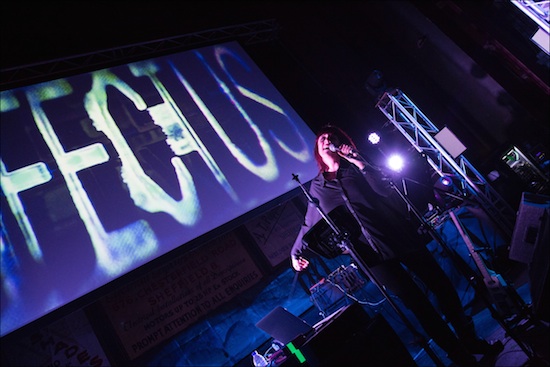
Photo by Pixelwitch Pictures
This year’s flagship Saturday night gig might be the most Sheffield thing that’s ever happened
Sheffield can be a nostalgic old town at times. Thus, we find ourselves in the the spectacular Abbeydale Picture House, a 1920s Grade II listed former cinema that’s been out of regular use for way too long. The people of Sheffield bloody love the Picture House, and rightly so: it’s a perfect example of an elegant artefact from Sheffield’s past that ought to be a cornerstone of its cultural future.
The people of Sheffield also bloody love Cabaret Voltaire, who transformed Steel City into Synth City in the ’70s and ’80s. The idea then, of seeing Cabs founder Stephen Mallinder play the Picture House with his current band Wrangler, is enough to entice even the most curmudgeonly middle-aged blokes who haven’t been to gig since about 1987 (“People never used to clap at Cabaret Voltaire gigs," one of them grumbles when he hears the audience applauding). Of course by the time Wrangler close with (you guessed it) Cabaret Voltaire’s ‘Sensoria’, it’s easy to see why people go on about “the good old days" ‒ Wrangler’s furious kraut inflections perfectly set the pace for headliners Carter Tutti.
Naturally, out-of-towners Chris Carter and Cosey Fanni Tutti arrive onstage to find a noticeably thinner audience ‒ because it wouldn’t be a regional tour date if a sizeable chunk of the crowd didn’t fuck off after watching their mates in the local support band. Still, their gripping industrial techno sounds perfectly at home, as Tutti’s cornet playing echoes around the ornate furnishings, casting a spell over every fifty-something Warp Records enthusiast in the room. Back in the town centre, Jarvis Cocker is doing a DJ set at a student night, but here on Abbeydale Road, at Sensoria, is where you’ll find what makes Sheffield special.
Don’t dick about with your air conditioning when you’re at a drive-in cinema
Guess who’s car wouldn’t start when we tried to leave Sensoria’s awesome closing event, a drive-in screening of Back To The Future? Yep, ol’ shit-for-brains here thought it would be a good idea to keep the air con running to stop the windscreen steaming up during the film, without really thinking about what that would do to his car battery. Huge thanks are owed to Jo and Nigel from Sensoria, not only for putting on an excellent week of events, but for giving us a push, knowing their way around a set of jump leads and, ultimately, for keeping us company until the AA arrived to help us home.
<div class="fb-comments" data-href="http://thequietus.com/articles/16450-things-learned-at-sensoria-festival-live-review” data-width="550">

